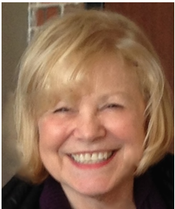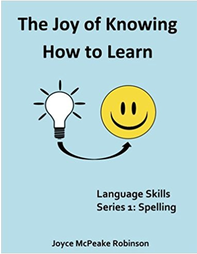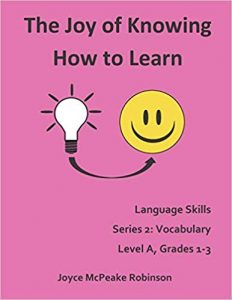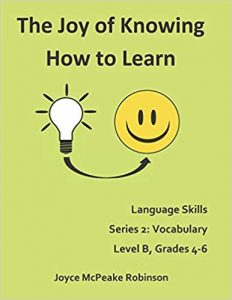Dr. Joyce McPeake Robinson

Dr. Joyce McPeake Robinson, international educator and author, currently serves as an independent educational consultant. She brings to her role a wealth of experience gained over the course of her career, as both teacher and administrator in both public and private schools, with a major part of her administrative career in international schools. As a provider of professional learning programs, she has given onsite assistance to schools across the country and also abroad. Her specializations include literacy, creativity, literature study, and school management. Dr. Robinson is a member of a number of honor societies, including: Cum Laude Society, Pi Lambda Theta and Phi Delta Kappa. She has received the International Peace Prize from the United Cultural Convention and the Woman of the Year from the National Council of Teachers of English, in addition to numerous other commendations.
Dr. Robinson is a graduate of Tufts University, and earned a master’s and doctorate degree from Boston University. She is also the past president and board member of the Association for the Advancement of Educational Research.

The Joy of Knowing How to Learn, Language Skills, Series 1: Spelling, is Dr. Robinson’s latest publication that applies stunning, recent brain research findings, showing how spelling mastery plays a key role in improving overall language skills, notably reading. Students actually learn how to spell by going through ten proven multisensory steps. The senses work to reinforce each other to optimize brain behavior for successful learning.
ISBN 9781545100196
From Amazon:
The Joy of Knowing How to Learn focuses on spelling in the first of the language skills series. Spelling currently ranks high on the list of language skills to teach early in school, according to recent research, as it has been found to play an important role in advancing reading and other language skills. This workbook includes a proven and tested ten-step study program that teaches learning how to spell, filling a need for materials that actually take students through successful learning steps. Students can expect to 1) make the spelling process automatic and 2) master 100 commonly misspelled words. Further study then can be independent, as students are able to spell additional words they need to learn. Included are the following: • Information for parents and educators • Instructions for students • Pre- and Post- tests • Ten-step learning process • 100 commonly misspelled words Expect success for a wide range of students, including special needs students, English language learners, homeschoolers and any others who benefit from direct spelling instruction, regardless of age or grade level. The study words, usually introduced in Grades 1-4, have been shown to continue as problem words for writers of all ages.
"Language Skills Series 1: Spelling should be helpful for students who struggle with the correct spelling of common words. Many of the commonly-misspelled words defy phonetic rules, and an approach such as this might be the solution."
Excerpt from Cathy Duffy Reviews (Homeschooling Newsletter)
Recent Publication, 2018: “Evaluation of Teaching Methods to Improve Reading Performance of English Language Learners” in Journal for the Advancement of Educational Research International, Vol 12, No 1.
Creative Works
“The Joy of Knowing how to Learn, Language Skills Series 1: Spelling”
“The Joy of Knowing How to Learn, Language Skills Series 2: Vocabulary Level A, Grades 1-3”
“The Joy of Knowing How to Learn, Language Skills Series 2: Vocabulary Level B, Grades 4-6”
“Teaching Reading for Creativity,” Fostering Creativity in Children, K-8: Theory and Practice
“Overview,” Portfolio of a School
“How to Double Your Child’s Grades in School (Revision Editor)
“Wordworks”
“Teaching Benjamin Franklin,” Poetry Press
“Stress-Proofing Your Child” (Contributor)
“Teaching Study Skills” (Contributor)
Who's Who Publications
Who’s Who in America – 2018, 71st Edition (pub. 2018)
Who’s Who in America – 2016, 70th Edition (pub. 2016)
Who’s Who in America – 2015, 69th Edition (pub. 2014)
Who’s Who in America – 2014, 68th Edition (pub. 2013)
Who’s Who in America – 2013, 67th Edition (pub. 2012)
Who’s Who in America – 2012, 66th Edition (pub. 2011)
Who’s Who in America – 2011, 65th Edition (pub. 2010)
Who’s Who in America – 2010, 64th Edition (pub. 2009)
Who’s Who in America – 2009, 63rd Edition (pub. 2008)
Who’s Who in America – 2008, 62nd Edition (pub. 2007)
Who’s Who in America – 2007, 61st Edition (pub. 2006)
Who’s Who in America – 2006, 60th Edition (pub. 2005)
Who’s Who in America – 2005, 59th Edition (pub. 2004)
Who’s Who in America – 2004, 58th Edition (pub. 2003)
Who’s Who in America – 2003, 57th Edition (pub. 2002)
Who’s Who in America – 2002, 56th Edition (pub. 2001)
Who’s Who in America – 2001, 55th Edition (pub. 2000)
Who’s Who in America – 2000, 54th Edition (pub. 1999)
Who’s Who in American Education – 2007-2008, 8th Edition (pub. 2007)
Who’s Who in the World – 2016, 33rd Edition (pub. 2016)
Who’s Who in the World – 2015, 32nd Edition (pub. 2014)
Who’s Who in the World – 2014, 31st Edition (pub. 2013)
Who’s Who in the World – 2013, 30th Edition (pub. 2012)
Who’s Who in the World – 2012, 29th Edition (pub. 2011)
Who’s Who in the World – 2011, 28th Edition (pub. 2010)
Who’s Who in the World – 2010, 27th Edition (pub. 2009)
Who’s Who in the World – 2009, 26th Edition (pub. 2008)
Who’s Who in the World – 2004, 21st Edition (pub. 2003)
Who’s Who in the World – 2002, 19th Edition (pub. 2001)
Who’s Who of American Women – 2010-2011, 28th Edition (pub. 2010)
Who’s Who of American Women – 2008-2009, 27th Edition (pub. 2008)
Who’s Who of American Women – 2006-2007, 25th Edition (pub. 2005)
Who’s Who of American Women – 2002-2003, 23rd Edition (pub. 2002)
Who’s Who of American Women – 2001-2002, 22nd Edition (pub. 2000)
Who’s Who of American Women – 1997-1998, 20th Edition (pub. 1997)
Site powered by Who’s Who Publishers

